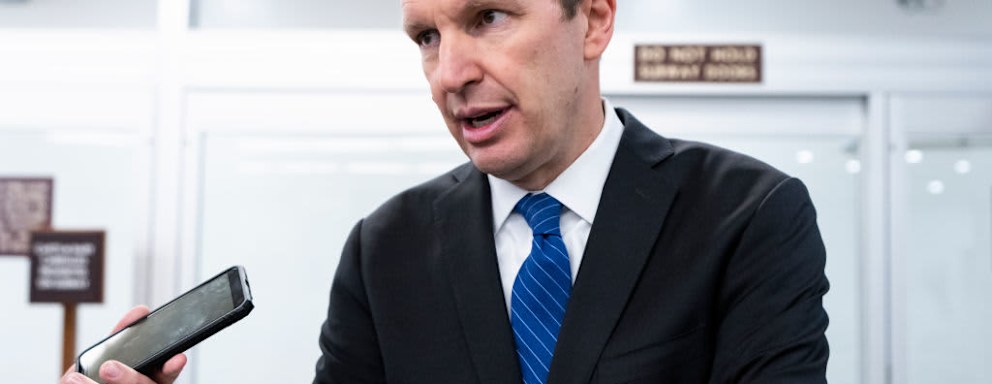College Athletes’ Mental Health Concerns Draw Congressional Attention
 Credit: Bill Clark / Contributor / CQ-Roll Call, Inc. / Getty Images
Credit: Bill Clark / Contributor / CQ-Roll Call, Inc. / Getty Images- Sen. Chris Murphy hosted a virtual panel discussion focused on athlete mental health.
- Athletes and advocates said Congress should look closer at NCAA player health and safety.
- Murphy described the issues faced by college athletes as “fundamentally a civil rights and economic rights issue.”
After writing an article about the mental health issues she faced as a college tennis player, Brittany Collens came to understand all too well the strains faced by college athletes. Now, she’s fighting to force the NCAA to prioritize athlete mental health and safety.
Collens played for the University of Massachusetts and has since turned professional. After her story published in The Players Tribune in April 2021, she was shocked when others responded with their stories of mental hardship and suicidal thoughts.
“The response I got from this article that I had written, kind of a letter, a cry out to the health and safety problems in college sports, was alarming,” Collens told U.S. Sens. Richard Blumenthal and Cory Booker during a virtual panel discussion focused on athlete mental health and safety.
“I had expected that there are other athletes who had dealt with similar issues in health and safety in college as myself but to see the word suicide and suicidal to me in my DMs from hundreds of college athletes and parents was horrifying,” Collens continued.
The virtual panel discussion was hosted by U.S. Sen. Chris Murphy, who joined with Blumenthal, Booker, and others to talk about inequities that exist within the NCAA and to offer solutions. The three Democratic senators have proposed federal legislation to address the issues faced by college athletes that Murphy described as “fundamentally a civil rights and economic rights issue.”
“The status quo is not sustainable,” Murphy said as Booker and Blumenthal agreed that the NCAA needs to do more to help athletes than just allowing them to cash in on their name, image, and likeness (NIL). In an October 2021 poll, college athletes called on the NCAA to prioritize their health and safety.
“We have put together a set of rights, a bill of rights, because protecting athletes means more than just financial compensation, more than just name, image, and likeness. It is about their health while they’re in school when they’re injured, to get proper medical care and afterward, when results of injuries appear later in life, a trust fund to help them,” Blumenthal said.
“There’s no bigger issue than health and safety,” said panelist Ramogi Huma, founder and president of the College Athletes Players Association. “The NCAA as a whole is an exploitative and predatory industry.”
Huma said now that NIL is in place, Congress needs to turn its attention to player safety and health. He noted that 85 college athletes died from sports-related activities between 2000-2018. A study of suicide among NCAA athletes also found 35 suicides among 477 deaths from 2003-2012.
“No safety standards exist for coaches, doctors, and trainers. No best practices. This is literally a matter of life and death,” Huma said.
Another panelist, former NCAA investigator Tim Nevius, said the pressure to perform, the pressure to excel in the classroom, the fear of losing a scholarship, and the immense amount of time that sports require impacts both the physical and mental health of student athletes.
“There’s internal pressure for athletes to play out of fear of losing their spot,” Collens said. “A lot of the time the mental abuse situation is put on by the athletes themselves because they fear being penalized otherwise.”
She said the NCAA should require all colleges to hire mental health professionals who are available just for athletes because “all athletes deal with mental health issues.”
In the piece she wrote for The Players’ Tribune, Collens told how her college records were wiped out by the NCAA three years after she graduated over infractions that involved an extra $504 in benefits for the UMass tennis program.
“The NCAA was protecting itself, keeping schools in fear under the guise of protecting, as they like to call it, ‘a revered tradition of amateurism,'” Collens wrote. “The NCAA takes credit for its athletes’ successes, but really, the athletes succeed in spite of the system. They succeed despite the fact that many of them live in poverty and suffer from mental health issues.”
“This tradition is preserved so that the NCAA can keep making money while denying its athletes basic rights. NCAA schools treat athletes like employees. They dictate schedules, impose time demands, enforce rules, and return athletes to play in the middle of a global pandemic. And they expect the athletes, the young kids, to follow these rules to the letter. Because that concept … that’s what keeps the lights on at the NCAA,” she wrote.